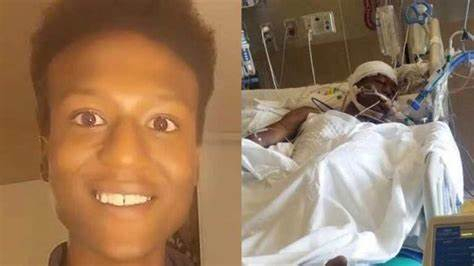Two Colorado paramedics, Peter Cichuniec and Jeremy Cooper, were found guilty of criminally negligent homicide in connection with the tragic death of Elijah McClain in 2019. This rare conviction of paramedics for their role in a civilian's death during a police encounter follows years of public outcry and protests.

The jury's verdict also included a second-degree assault charge against Cichuniec, while Cooper was acquitted of assault charges. The trial marked an unusual instance where paramedics faced criminal liability for actions resulting in a civilian's death during police custody.
Elijah McClain, a 23-year-old massage therapist, was stopped by police on his way home on August 24, 2019. Subsequently, he became unconscious while being restrained by multiple officers before paramedics arrived. The paramedics injected him with a dangerously, contributing to his tragic demise.
Both paramedics, along with three police officers, were subject to criminal prosecution for their involvement in McClain's death. The incident, captured on body-camera footage, depicted McClain pleading for his life as he struggled to breathe. This distressing scene triggered national outrage and intensified the call for justice.
During the trial, paramedics' attorneys sought to shift blame onto the police, while the officers' defense argued in previous trials that the paramedics' administration of ketamine was the primary cause of McClain's death.
The tragic sequence of events began when a passerby called 911 to report McClain as a "sketchy" person, emphasizing uncertainty about his character. Despite no immediate threat and the absence of weapons, McClain's attire, a ski mask used for warmth due to anemia, caught the caller's attention.
Video footage displayed officers approaching McClain aggressively, restraining him, and using force. Despite McClain's repeated cries of "I can't breathe," paramedics Cichuniec and Cooper, upon arrival, allegedly did not check his vital signs or engage with him. Instead, they diagnosed him with "excited delirium," a term widely criticized in recent years for its lack of recognition by major medical associations.
Overdose of ketamine
The paramedics, without proper assessment, ordered and administered ketamine to McClain. Cooper's miscalculation of McClain's weight led to an overdose, resulting in McClain losing consciousness and never regaining it. The coroner's revised autopsy attributed McClain's death to "complications of ketamine administration following forcible restraint."
This verdict comes after the conviction of one Aurora officer, Randy Roedema, in October for criminally negligent homicide and third-degree assault. Notably, two other officers were acquitted, including Nathan Woodyard, who initially stopped McClain and placed him in a neck hold.
Woodyard, recently reinstated, will receive $200,000 in back pay from his unpaid suspension during the trial. The verdict against the paramedics marks a pivotal moment in holding emergency medical responders accountable for their actions in cases of police custody deaths.








